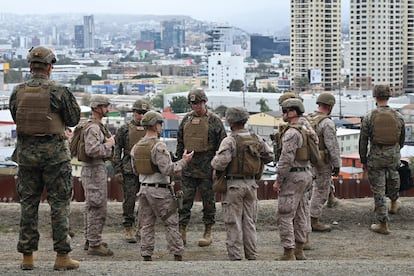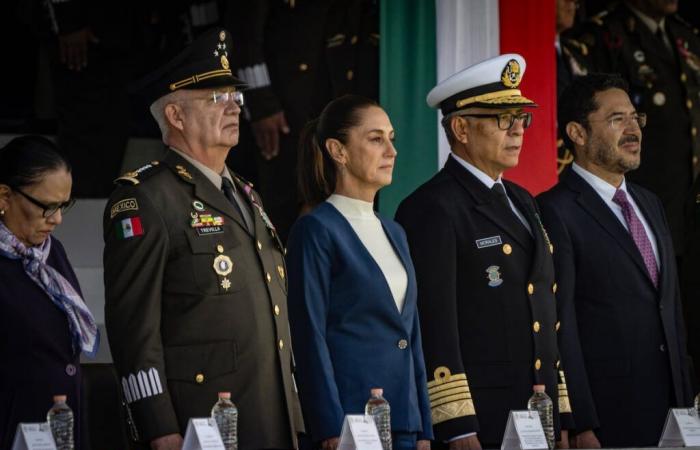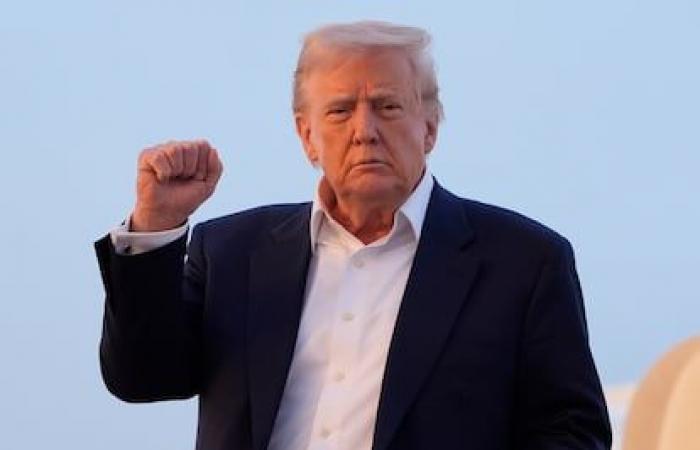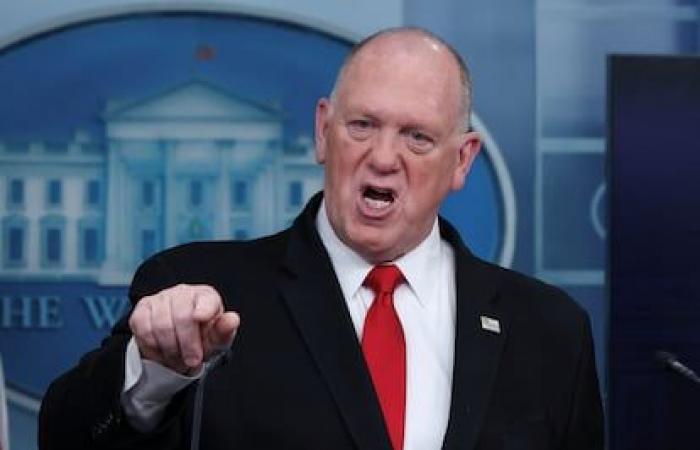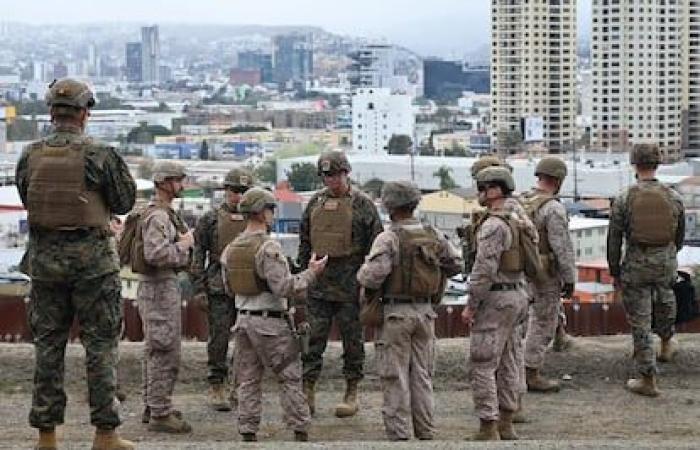Months were still missing for Donald Trump to take possession as president of the United States and there was already a question that he planned within the Republican horizon: How much should Mexico invade? The question divided the Trumpist administration among those who bet on “a military solution” against drug trafficking posters and those who were looking for a more prudent position that did not make the bilateral relationship jump through the air. The executive of Claudia Sheinbaum, who has always taken the veiled threat seriously, has since reminding his neighbor that he will not allow an interference in his sovereignty. This week, in the box of surprises that has become the relationship with Trump, the issue has returned to the first line after the Republican said that the Mexican president “is a lovely woman” but that she has “so much fear of cartels that he cannot even think clearly.”
On the same weekend, Donald Trump is able to ensure that he would not need to use the military force to turn Canada into “the 51st state” of the United States – a couple of days before the visit of the new prime minister, Mark Carney – that “something could happen with Greenland” because they need it “for national and international security”, and that Mexico is wrong to reject military help to end the military aid to end the groups drug trafficking All this “is part of the same puzzle,” says the researcher at the Universidad Iberoamericana Abelardo Rodríguez: Trump’s obsession, cornered by China’s rise, to return to an old idea of the United States with an “imperial vision, territorial and military extension.”
Given these provocations, the Mexican president has already conjugated all possible variations of “cooperation yes, no submission.” Sheinbaum repeats as talisman the concept of “sovereignty”, both daily in his press conferences and in his calls with Trump. On April 16, the two leaders had one of their last telephone conversations. The two celebrated it equally on the social network X: “A very productive call.” The Wall Street Journal He has now unveiled that one of the issues that the presidents played was the American proposal that the army would enter Mexico to “help fight” drug trafficking.
“And they know what I said? ‘No, President Trump,” Sheinbaum explained on Saturday: “The territory is inviolable, sovereignty is inviolable, sovereignty is not sold; sovereignty is loved and defends. It is not necessary; you can collaborate, we can work together, but you in your territory, in ours. We can share information, but we will never accept the presence of the United States army in our territory.” The prudent position of the president has also remained this Monday, although Trump has affirmed that she cannot advance or think clearly: “Everyone has their way of communicating, but I do not want a debate to become this, through the media, with the government of the United States. There is still good communication,” Sheinbaum has settled: “And why generate a disagree?”
Drones or kidnappings
Trump and his bishops have never hidden the possibility of military intervention. The president himself, after signing in his first wave of decrees the designation of six Mexican posters as terrorist organizations, said: “It could happen, strangest things have happened.” His secretary of state, Marco Rubio, acknowledged that it was “one option” although it was better to seek coordination with the Mexican authorities. The leader of the Pentagon, Pete Hegseth, said that military action “is what can be needed, eventually,” but “with intelligence” and “precision attacks.” The tsar of the Tom Homan border pointed out that the country was willing to use “the entire strength of the special operations of the United States to eliminate posters.”
The proposals – which have leaked means such as Rolling Stone o The New York Times– From the Trumpist paintings they range from sending military advisors to Mexico, cyber war against drug lords and their networks, to drones attacks to drug laboratories or the deployment of assault equipment, kidnapping and extermination on Mexican soil.
“There is a continuous strategy for a year of causing a debate about the possibility of the presence of United States forces in Mexico,” says security analyst Carlos Pérez Ricart, “it is a button that is pressed every three or four weeks, because it is an internal issue, designed for Trump’s public, but that clashes what the security agencies are saying, such as the DEA or the CIA, that Mexico is complying with the demands.” In recent months, in full pressure for the tariff war, Sheinbaum has sent 10,000 agents to the US border, has delivered 29 drug trafficking capos – among them Rafael Caro Quintero – and has seized fentanyl historical loads. The president continues to deliver the duties.
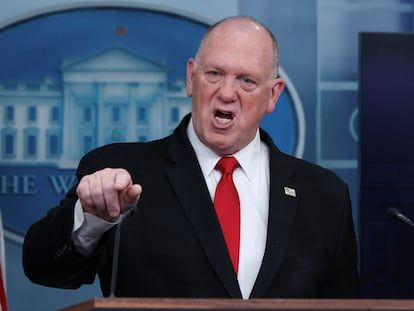
“Military invasion is actually a distant possibility for those who really make decisions, such as Marco Rubio,” says Pérez Ricart, a CIDE researcher: “It is possible, it is possible, but it is not likely. It would be a problematic decision, which would put the president in a tremendous dilemma, but that does not favor the interests of the United States either.” Along the same lines, security expert Abelardo Rodríguez points out: “He would not solve anything. A path of military intervention without a review of the internal strategy of the United States would only cause greater instability: if the US wants to do something, he has to start with drug use within his territory and for the illegal and criminal sale of arms that favors the posters.”
The Ibero -American researcher agrees that it is “a political issue”, but he believes that it is a real path that Trump has had in mind since his first government and for which he can bet now that he has control of the Congress and the Supreme Court of Justice. “This has to be read within the framework of the rupture of peaceful cooperation, respect for international law and multilateral order,” he says. Since he took possession, Trump has left the world Health Organization and the Climate Agreement of Paris, has initiated a commercial war against the rest of the world and has affirmed that he will return UU to his “golden age”.
“For history we know that the United States can commit this type of unilateral interventions,” says Pia Taracena, specialist in international affairs, “but to Mexico, from the war grievances of 1848, he has respected it. We are a neighboring country even without a military base.” The three experts recognize in the country the last variable at play, which is always on the table with Trump: uncertainty. “We are as in a state of exception. The margin of Sheinbaum is millimeter, it is very difficult to move the needle and it is very easy to make mistakes,” says Pérez Ricart: “And this is going to be so four more years.”
